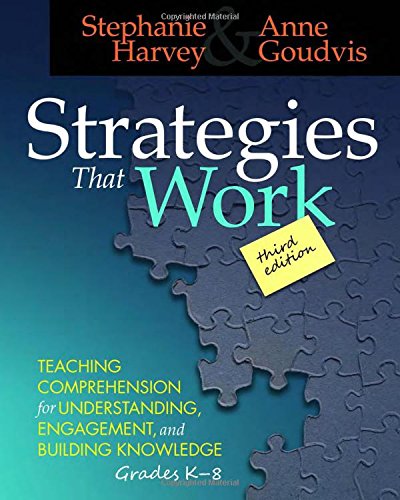
Price: [price_with_discount]
(as of [price_update_date] - Details)

[ad_1]
In this new edition of their groundbreaking book Strategies That Work, Stephanie Harvey and Anne Goudvis share the work and thinking they’ve done since the second edition came out a decade ago and offer new perspectives on how to explicitly teach thinking strategies so that students become engaged, thoughtful, independent readers.
Thirty new lessons and new and revised chapters shine a light on children’s thinking, curiosity, and questions. Steph and Anne tackle close reading, close listening, text complexity, and critical thinking in a new chapter on building knowledge through thinking-intensive reading and learning. Other fully revised chapters focus on digital reading, strategies for integrating comprehension and technology, and comprehension across the curriculum.
The new edition is organized around three sections:
Part I provides readers with a solid introduction to reading comprehension instruction, including the principles that guide practice, suggestions for text selection, and a review of recent research that underlies comprehension instruction.
Part II contains lessons to put these principles into practice for all areas of reading comprehension.
Part III shows you how to integrate comprehension instruction across the curriculum and the school day, particularly in science and social studies.
Updated bibliographies, including the popular “Great Books for Teaching Content,” are accessible online.
Since the first publication of Strategies That Work, more than a million teachers have benefited from Steph and Anne’s practical advice on creating classrooms that are incubators for deep thought. This third edition is a must-have resource for a generation of new teachers—and a welcome refresher for those with dog-eared copies of this timeless guide to teaching comprehension.
Thirty new lessons and new and revised chapters shine a light on children’s thinking, curiosity, and questions. Steph and Anne tackle close reading, close listening, text complexity, and critical thinking in a new chapter on building knowledge through thinking-intensive reading and learning. Other fully revised chapters focus on digital reading, strategies for integrating comprehension and technology, and comprehension across the curriculum.
The new edition is organized around three sections:
Part I provides readers with a solid introduction to reading comprehension instruction, including the principles that guide practice, suggestions for text selection, and a review of recent research that underlies comprehension instruction.
Part II contains lessons to put these principles into practice for all areas of reading comprehension.
Part III shows you how to integrate comprehension instruction across the curriculum and the school day, particularly in science and social studies.
Updated bibliographies, including the popular “Great Books for Teaching Content,” are accessible online.
Since the first publication of Strategies That Work, more than a million teachers have benefited from Steph and Anne’s practical advice on creating classrooms that are incubators for deep thought. This third edition is a must-have resource for a generation of new teachers—and a welcome refresher for those with dog-eared copies of this timeless guide to teaching comprehension.
[ad_2]